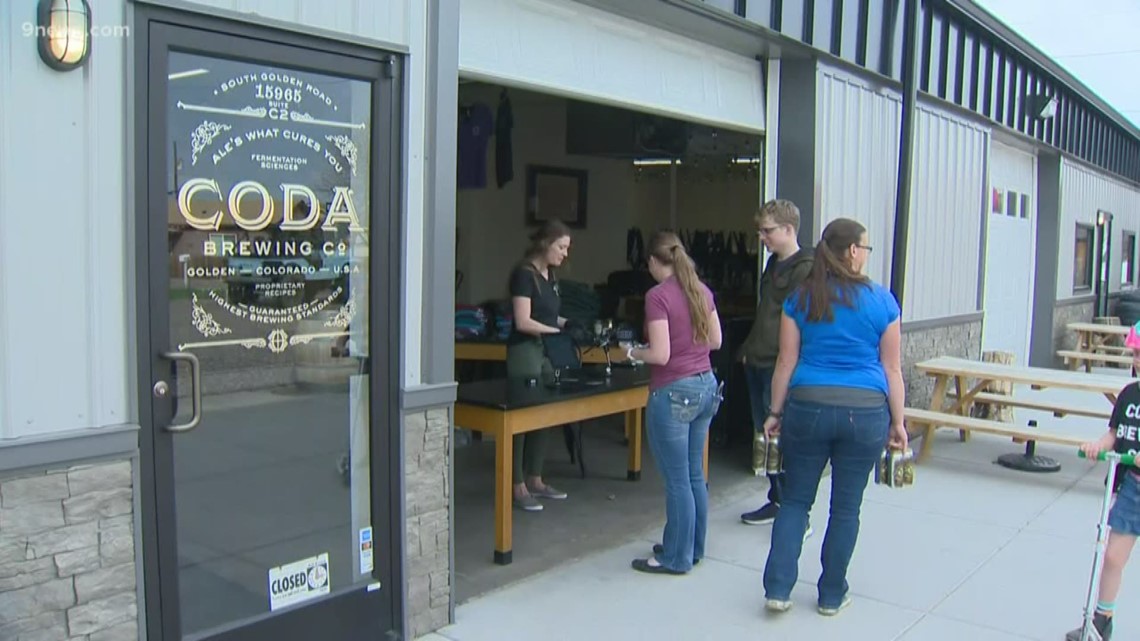COLORADO, USA — There’s a headline written by the Brewers Association no self-respecting lover of craft beer wants to admit is true: ‘Brewery Sales Dropping Sharply, Many Set to Close.’
It comes off as a dire warning, but in the face of a pandemic, orders to stay home and lost paychecks, which could translate to a lessened ability to support breweries, the headline hints at what seems like an inevitability.
“The headline’s dire because for many of these businesses, the outcome is uncertain right now,” said Bart Watson, chief economist for the Brewers Association.
He’s the guy that wrote the headline that tops the results of the association’s second survey sent to breweries nationwide.
“For this survey, we were trying to delve into the specific business effects breweries are feeling,” said Watson. “We were trying to quantify the impact both from sales and then also workforce, layoffs they’ve had to make, and then understand given those changes, what does their business look like if social distancing orders stay in place for one month, three months, six months or longer.”
The United States is home to a little more than 7,000 brewing companies right now.
It’s important to note that the results of this survey were based on 525 responses received from breweries in 49 states and the District of Columbia as of April 9.
The Colorado-specific results are based on 38 responses out of the state’s 400 or so breweries.

“The median craft brewery in the United States makes 375 barrels, which, that’s a local brewpub or a taproom,” said Watson. “That’s somebody who sells the vast majority of their beer right there at their brewery.”
According to the survey, on average, sales on site have dropped about 65% at breweries nationwide, a number that’s only one percentage point lower than Colorado’s current average.
Sales to restaurants that sell draft beer are even worse: an average 91% drop nationally and 93% in Colorado.
After disclosing their losses in the survey, breweries were then asked this question: "Given current costs, revenues and the current level of state and federal aid, how long do you project you can sustain your current business if social distance measures stay where they are now?"
“A little bit more than 2% of breweries already think they’re going to have to close,” Watson said. “We haven’t gotten any responses from Colorado brewers saying they have to close yet, which is good.”
Looking further ahead, the majority of breweries surveyed did not think their business could last beyond another one to three months of stay-home orders; 45.8% nationally, 63.2% in Colorado.
“Is that going to take a huge dent out of the total craft market, maybe not,” said Watson.” Most of the ones who think they’re going to close are the smallest and most local. It all depends on how long this lasts and what the recovery looks like.”
In the meantime, breweries are trying to offset their losses by offering alternatives such as online ordering with curbside delivery and to-go beer.


How much it helps depends on the brewery.
“What we saw on average is that those are only making up about 35% of the previous sales,” said Watson. “It makes a difference, don’t get me wrong, but this is a band-aid on a gaping wound. It’s not going to be a long-term solution.”
There are bright spots though.
“I think this is going to build some new sales channels for some breweries,” said Watson. “Some breweries that do make it through this are going to have a lot of experience now in to-go and delivery, maybe building new e-commerce or direct-to-consumer platforms. So, the breweries that come out of this might be a little more resilient.”
Another bright spot has to do with the communities that are passionate about supporting their local breweries.


“The fact that breweries have been able to make up any sales with to-go, with curbside, shows how many fans they have here in Colorado and all across the United States,” said Watson.
There are also new breweries still opening.
“People are going straight into the to-go, the delivery,” said Watson. “If you’ve already taken out your debt, if you’ve already found a spot, you’ve put in your tanks and you’re ready to go, there’s not much you can do other than make a go of it.”
The comradery within the industry also helps.
For example, a Colorado canning company is donating its services, canning beer for breweries that have never canned before and saving product that could otherwise have been lost.
“There’s going to be some canned beer out there that’s never been available before from draft-only breweries,” said Watson. “Maybe that’s another silver lining that it will give some Colorado beer lovers a chance to find something new that they might otherwise not have found.”
The Brewers Association is also working on options like an expired beer tax credit.
“One of the challenges that breweries face is they have a lot of draft beer on the marketplace that might go out of code during this,” said Watson. “We’re also working on specific measures to try to direct more aid to hospitality businesses.”
Predictions in terms of closures are difficult to make given the uncertainty of the pandemic.
“I think it’s safe to say that more breweries are going to close this year than were going to anyway,” said Watson. “We’re hopeful that innovative small brewery owners can figure out ways to drive some revenue, but the longer this lasts and the more the summer season, which is really where a lot of breweries make the vast majority of their money, the more that gets cut into, the more challenging it’s going to be.”
SUGGESTED VIDEOS | Colorado Guide

